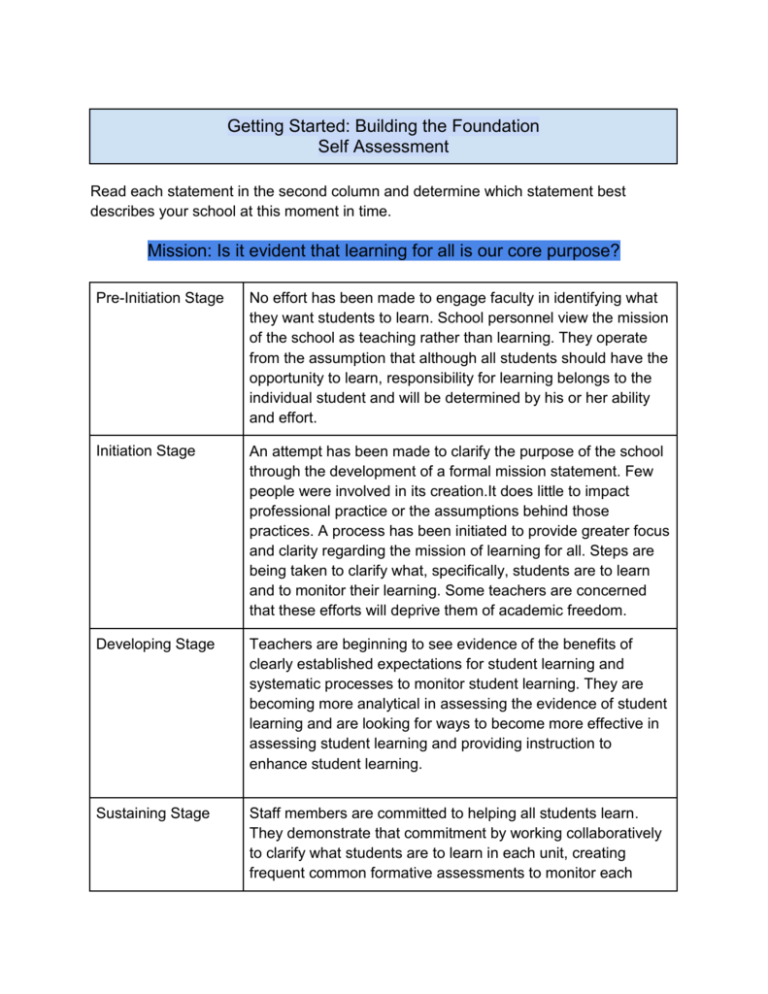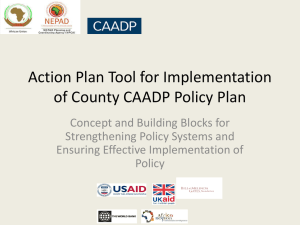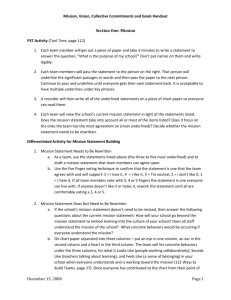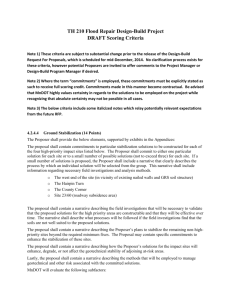Getting Started Self Assessment
advertisement

Getting Started: Building the Foundation Self Assessment Read each statement in the second column and determine which statement best describes your school at this moment in time. Mission: Is it evident that learning for all is our core purpose? Pre-Initiation Stage No effort has been made to engage faculty in identifying what they want students to learn. School personnel view the mission of the school as teaching rather than learning. They operate from the assumption that although all students should have the opportunity to learn, responsibility for learning belongs to the individual student and will be determined by his or her ability and effort. Initiation Stage An attempt has been made to clarify the purpose of the school through the development of a formal mission statement. Few people were involved in its creation.It does little to impact professional practice or the assumptions behind those practices. A process has been initiated to provide greater focus and clarity regarding the mission of learning for all. Steps are being taken to clarify what, specifically, students are to learn and to monitor their learning. Some teachers are concerned that these efforts will deprive them of academic freedom. Developing Stage Teachers are beginning to see evidence of the benefits of clearly established expectations for student learning and systematic processes to monitor student learning. They are becoming more analytical in assessing the evidence of student learning and are looking for ways to become more effective in assessing student learning and providing instruction to enhance student learning. Sustaining Stage Staff members are committed to helping all students learn. They demonstrate that commitment by working collaboratively to clarify what students are to learn in each unit, creating frequent common formative assessments to monitor each student’s learning on an ongoing basis, and implementing a systematic plan of intervention when students experience difficulty. They are willing to examine all practices and procedures in light of their impact on learning. Shared Vision: Do we know what we are trying to create? Pre-Initiation Stage No effort has been made to engage staff in describing the preferred conditions for the school. Initiation Stage A formal vision statement has been created for the school,but most staff members are unaware of it. Developing Stage Staff members have participated in a process to clarify the school they are trying to create, and leadership calls attention to the resulting vision statement on a regular basis. Many staff members question the relevance of the vision statement, and their behavior is generally unaffected by it. Sustaining Stage Staff members have worked together to describe the school are trying to create. They have endorsed this general description and use it to guide their school improvement efforts and their professional development. Staff members can and do routinely articulate the major principles of the school’s shared vision and use those principles to guide their day-to-day efforts and decisions. They honestly assess the current reality in their school and continually seek more effective strategies for reducing the discrepancy between that reality and the school they are working to create. Shared Values: How must we behave to advance our vision? Pre-Initiation Stage Staff members have not yet articulated the attitudes, behaviors, or commitments they are prepared to demonstrate in order to advance the mission of learning for all and the vision of what the school might become. Initiation Stage Administrators or a committee of teachers have created statements of beliefs regarding the school’s purpose and its direction. Staff members have reviewed and reacted to those statements. Initial drafts have been amended based on staff feedback. There is no attempt to translate the beliefs into the specific commitments or behaviors that staff will model. Developing Stage A statement has been developed that articulates the specific commitments staff have been asked to embrace to help the school fulfill its purpose and move closer to its vision. The commitments are stated as behaviors rather than beliefs. Many staff object to specifying these commitments and prefer to focus on what other groups must do to improve the school. Sustaining Stage Staff members have been engaged in the process to articulate the collective commitments that will advance the school toward its vision. They endorse the commitments and seek ways to bring them to life in the school. The collective commitments are embraced by staff, embedded in the school’s culture, and evident to observers of the school. They help define the school and what it stands for. Examples of the commitments are shared in stories and celebrations, and people are challenged when they behave in ways that are inconsistent with the collective values and commitments. Goals: What are our priorities? Pre-Initiation Stage No effort has been made to engage the staff in establishing school improvement goals related to student learning. Initiation Stage Goals for the school have been established by the administration or school improvement team as part of the formal district process for school improvement.Most staff would be unable to articulate a goal that has been established for their school. Developing Stage Staff members have been made aware of the long-term and short-term goals for the school. Tools and strategies have been developed and implemented to monitor the school’s progress toward its goals. Little has been done to translate the school goal into meaningful targets for either collaborative teams or individual teachers.The school goal has been translated into specific goals that directly impact student achievement for each collaborative team. If teams are successful in achieving their goals, the school will achieve its goal as well. Teams are exploring different strategies for achieving their goals. Sustaining Stage All staff members pursue measurable goals that are directly linked to the school’s goals as part of their routine responsibilities. Teams work interdependently to achieve common goals for which members are mutually accountable. The celebration of the achievement of goals is part of the school culture and an important element in sustaining the process. -adapted from Learning by Doing, Dufour, Dufour, Eaker & Many










